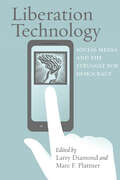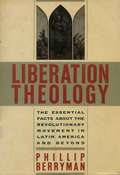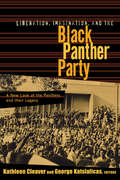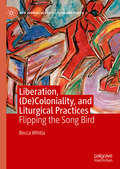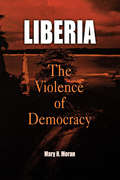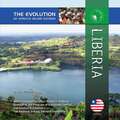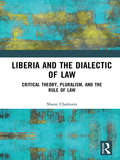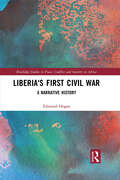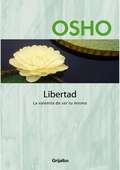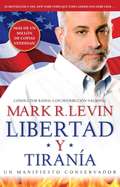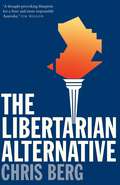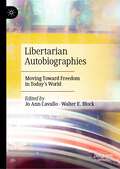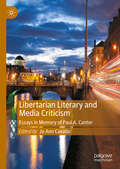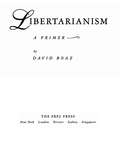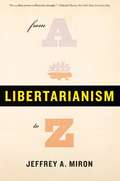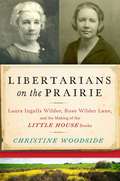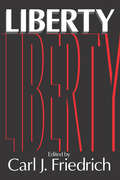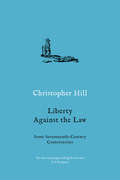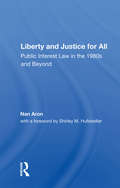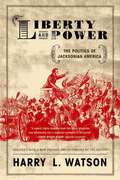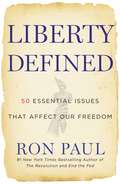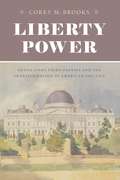- Table View
- List View
Liberation Technology: Social Media and the Struggle for Democracy (A Journal of Democracy Book)
by Larry Diamond and Marc F. PlattnerThe revolutions sweeping the Middle East provide dramatic evidence of the role that technology plays in mobilizing citizen protest and upending seemingly invulnerable authoritarian regimes. A grainy cell phone video of a Tunisian street vendor’s self-immolation helped spark the massive protests that toppled longtime ruler Zine El Abidine Ben Ali, and Egypt’s "Facebook revolution" forced the ruling regime out of power and into exile. While such "liberation technology" has been instrumental in freeing Egypt and Tunisia, other cases—such as China and Iran—demonstrate that it can be deployed just as effectively by authoritarian regimes seeking to control the Internet, stifle protest, and target dissenters. This two-sided dynamic has set off an intense technological race between "netizens" demanding freedom and authoritarians determined to retain their grip on power.Liberation Technology brings together cutting-edge scholarship from scholars and practitioners at the forefront of this burgeoning field of study. An introductory section defines the debate with a foundational piece on liberation technology and is then followed by essays discussing the popular dichotomy of "liberation" versus "control" with regard to the Internet and the sociopolitical dimensions of such controls. Additional chapters delve into the cases of individual countries: China, Egypt, Iran, and Tunisia.This book also includes in-depth analysis of specific technologies such as Ushahidi—a platform developed to document human-rights abuses in the wake of Kenya’s 2007 elections—and alkasir—a tool that has been used widely throughout the Middle East to circumvent cyber-censorship.Liberation Technology will prove an essential resource for all students seeking to understand the intersection of information and communications technology and the global struggle for democracy.Contributors: Walid Al-Saqaf, Daniel Calingaert, Ronald Deibert, Larry Diamond, Elham Gheytanchi, Philip N. Howard, Muzammil M. Hussain, Rebecca MacKinnon, Patrick Meier, Evgeny Morozov, Xiao Qiang, Rafal Rohozinski, Mehdi Yahyanejad
Liberation Theology: Essential Facts about the Revolutionary Movement in Latin America--and Beyond
by Phillip BerrymanIn the chaos that is Latin American politics, what role does the Catholic church play with regard to its clergy and its members? How does the church function in Latin America on an everyday, practical level? And how successful has the church been intervening in political matters despite the fact that Latin American countries are essentially Catholic nations? Philip Berryman addresses these timely and challenging issues in this comprehensive. Unlike journalistic accounts, which all too frequently portray liberation theology as an exotic brew of Marxism and Christianity or as a movement of rebel priests bent on challenging church authority, this book aims to get beyond these cliches, to explain exactly what liberation theology is, how it arose, how it works in practice, and its implications. The book also examines how liberation theology functions at the village or barrio level, the political impact of liberation theology, and the major objections to it posed by critics, concluding with a tentative assessment of the future of liberation theology. Author note: Phillip Berryman was a pastoral worker in a barrio in Panama during 1965-73. From 1976 to 1980, he served as a representative for the American Friends Service Committee in Central America. In 1980, he returned from Guatemala to the United States and now lives in Philadelphia.
Liberation, Imagination and the Black Panther Party: A New Look at the Black Panthers and their Legacy (New Political Science Reader)
by Kathleen Cleaver George KatsiaficasThis fascinating book gathers reflections by scholars and activists who consider the impact of the Black Panther Party, the BBP, the most significant revolutionary organization in the later 20th century.
Liberation,: Flipping the Song Bird (New Approaches to Religion and Power)
by Becca WhitlaBecca Whitla uses liberationist, postcolonial, and decolonial methods to analyze hymns, congregational singing, and song-leading practices. By way of this analysis, Whitla shows how congregational singing can embody liberating liturgy and theology. Through a series of interwoven theoretical lenses and methodological tools—including coloniality, mimicry, epistemic disobedience, hybridity, border thinking, and ethnomusicology—the author examines and interrogates a range of factors in the musical sphere. From beloved Victorian hymns to infectious Latin American coritos; congregational singing to radical union choirs; Christian complicity in coloniality to Indigenous ways of knowing, the dynamic praxis-based stance of the book is rooted in the author’s lived experiences and commitments and engages with detailed examples from sacred music and both liturgical and practical theology. Drawing on what she calls a syncopated liberating praxis, the author affirms the intercultural promise of communities of faith as a locus theologicus and a place for the in-breaking of the Holy Spirit.
Liberia
by Mary H. MoranLiberia, a small West African country that has been wracked by violence and civil war since 1989, seems a paradoxical place in which to examine questions of democracy and popular participation. Yet Liberia is also the oldest republic in Africa, having become independent in 1847 after colonization by an American philanthropic organization as a refuge for "Free People of Color" from the United States. Many analysts have attributed the violent upheaval and state collapse Liberia experienced in the 1980s and 1990s to a lack of democratic institutions and long-standing patterns of autocracy, secrecy, and lack of transparency. Liberia: The Violence of Democracy is a response, from an anthropological perspective, to the literature on neopatrimonialism in Africa.Mary H. Moran argues that democracy is not a foreign import into Africa but that essential aspects of what we in the West consider democratic values are part of the indigenous African traditions of legitimacy and political process. In the case of Liberia, these democratic traditions include institutionalized checks and balances operating at the local level that allow for the voices of structural subordinates (women and younger men) to be heard and be effective in making claims. Moran maintains that the violence and state collapse that have beset Liberia and the surrounding region in the past two decades cannot be attributed to ancient tribal hatreds or neopatrimonial leaders who are simply a modern version of traditional chiefs. Rather, democracy and violence are intersecting themes in Liberian history that have manifested themselves in numerous contexts over the years.Moran challenges many assumptions about Africa as a continent and speaks in an impassioned voice about the meanings of democracy and violence within Liberia.
Liberia (The Evolution of Africa's Major Nations)
by Brian BaughanThe early history of Liberia was promising. Under the auspices of white Americans, freed slaves had been offered a new home in the West African region during the early 19th century. In 1847 the settlers founded the continent's first independent republic--a full century before the rest of Africa began to shake off colonial rule. Although the new republic modeled itself on the United States--and even named its cities after U.S. leaders--it has nevertheless endured sluggish development, class division, and a brutal civil war during the 1990s that resulted in 200,000 deaths. In their struggle for stability, the Liberian people have forged peace agreements between the warring political parties and established a new, freely elected government in 2006, becoming the first African country to elect a woman as president.
Liberia and the Dialectic of Law: Critical Theory, Pluralism, and the Rule of Law
by Shane ChalmersIt is the condition of modernity that an institution cannot depend on a god, tradition, or any other transcendental source to secure its foundations, which thereby come to rest upon – or rather in, and through – its subjects. Never wholly separated from its subjects, and yet never identical with them: this contradictory condition provides a way of seeing how modern law gives form to life, and how law takes form, enlivened by its subjects. By driving Theodor Adorno’s dialectical philosophy into the concept of law, the book shows how this contradictory condition enables law to become instituted in ways that are hostile to its subjects, but also how law remains open to its subjects, and thus disposed towards transformation. To flesh out an understanding of this contradiction, the book examines the making and remaking of “Liberia”, from its conception as an idea of liberty at the beginning of the nineteenth century to its reconstruction at the beginning of the twenty-first with the assistance of an international intervention to “establish a state based on the rule of law”. In so doing, the book shows how law is at the epicentre of a colonising power in Liberia that renders subjects as mere objects; but at the same time, the book exposes the instability of this power, by showing how law is also enlivened by its subjects as it takes form in and through their lives and interactions. It is this fundamentally contradictory condition of law that ultimately denies power any absolute hold, leaving law open to the self-expression of its subjects.
Liberia's First Civil War: A Narrative History (Routledge Studies in Peace, Conflict and Security in Africa)
by Edmund HoganThis book provides a comprehensive narrative history of Liberia’s first civil war, from its origins in the 1980s right through the conflict and up to the peace agreement and conclusion of hostilities in 1997. The first Liberian Civil War was one of Africa’s most devastating conflicts, claiming the lives of more than 200,000 Liberians, and sending shockwaves across the world. Drawing on a wide range of local and international sources, the book traces the background of the war and its long-term and immediate causes, before analysing the detail of the unfolding conflict, the eventual ceasefire, peace agreement and subsequent elections. In particular, the book shines a light on hitherto unseen first-hand Roman Catholic indigenous and missionary sources, which offer a rare intimacy to the analysis. Detailing the impact of Liberia’s individual warlords and peacemakers, the book also explains the roles played by non-governmental agencies, national, regional and international actors, by the UN, ECOWAS and the Organisation of African Unity, and by nations with special interests and influence, such as the USA and other West African states. This book’s detailed narrative analysis of the Liberian conflict will be an important read for anyone with an interest in the Liberian conflict, including researchers within African studies, political science, contemporary history, international relations, and peace and conflict studies.
Libertad
by Osho OshoIdentifica y supera los obstáculos que encuentres en el camino hacia tu libertad. En Libertad Osho define tres estadios: El primero es la «libertad de», una libertad que procede de la ruptura de la «esclavitud psicológica» impuesta por las fuerzas externas como la familia o la religión. El segundo es la «libertad para», una libertad que deriva de una actitud o circunstancia de signo positivo (un abrazo, la creaciónde algo, una relación que nos llena o una visión artística o humanitaria). El tercero y último es la «libertad simple», la más elevada y primordial. Se trata, en realidad, de la libertad de ser simplemente uno mismo y responder sinceramente a cada requerimiento de la vida. Osho nos invita a enfrentarnos a todo aquello que se nos plantea como un reto para, partiendo de cada uno de nosotros, crear un nuevo ser humano que sepa equilibrar la libertad con la responsabilidad y que tenga verdadera independencia de criterio, ya que la libertad verdadera es espiritual: tiene que ver con nuestro interior, puesto que éste no puede ser esposado, encarcelado ni encadenado.
Libertad y Tiranía
by Mark R. LevinCuando Libertad y tiranía, del conductor radial con distribución nacional Mark R. Levin, apareció en los primeros meses de la presidencia de Obama, los estadounidenses respondieron haciendo de su claro y sonoro llamado por una nueva era conservadora, el bestseller #1 del New York Times por unas asombrosas once semanas consecutivas. Tan provocativa, bien razonada, robusta e informada como su comentario radial, con su amor por nuestro país y el legado de los Padres Fundadores reflejados en cada página, la narrativa estimulante de Levin provee un marco filosófico, histórico y práctico para revitalizar la visión conservadora y asegurar la preservación de la sociedad estadounidense. Ante el asalto liberal moderno de los valores basados en la Constitución, un ataque que ha resultado en un gobierno federal que es un conglomerado masivo e inexplicable, el tiempo de reforzar el argumento intelectual y práctico por el conservatismo es este. En una serie de ensayos poderosos, Levin explica cómo los conservadores pueden contrarrestar la corrosión liberal tiránica que se ha filtrado en cada cuestión oportuna afectando así nuestra vida cotidiana, desde la economía hasta el seguro de salud, el calentamiento global, inmigración y más--e ilustra cómo el cambio, tal cual es visto por la lente del conservador, siempre es prudente, y siempre una mejora para la libertad individual.
Libertarian Alternative
by Chris BergLibertarianism—the philosophy of government that pairs free market economics with social liberalism—presents a vigorous and viable political alternative to the old Left-Right partisan shouting match.Libertarianism offers surprising new solutions to stagnant policy debates over issues such as immigration and civil rights, and provides a framework for tackling contemporary problems like privacy, the environment and technological change.In The Libertarian Alternative, Chris Berg offers a new agenda for restoring individual liberty in Australia, revitalising politics and strengthening our sagging economy.
Libertarian Autobiographies: Moving Toward Freedom in Today’s World
by Jo Ann Cavallo Walter E. BlockInfluential libertarians from diverse backgrounds and professions who have worked toward a freer society across the globe share their personal and intellectual journeys, including what their lives and thoughts were before they embraced libertarianism; which people, texts, or events most inspired them; what experiences, challenges, tribulations, and achievements they have had as participants or leaders in this movement, and how this philosophy has affected their private and professional lives. The volume’s 80 contributors span the political-philosophical spectrum of libertarianism, including anarcho-capitalists, minarchists, constitutionalists, classical liberals, and thick libertarians. Their essays express different perspectives on many issues even while articulating such core principles as an appreciation for individual liberty, private property rights, the rule of law, and free enterprise. Together, they represent myriad individual journeys toward libertarianism, however defined. By bringing together a range of contemporary voices from outside the dominant left-right paradigm, this book aims to contribute to the viewpoint diversity that is crucially needed in today’s public discourse. These autobiographies not only offer compelling insights into their individual authors and the state of the world today, but may also inspire the next generation to make our society a freer one.
Libertarian Literary and Media Criticism: Essays in Memory of Paul A. Cantor
by Jo Ann CavalloThis volume applies libertarian philosophy and free-market economic theory to both literature and media, from early modern drama to novels to comic books, cinema, and television series. Several chapters contrast capitalism with statism, focusing on the market economy versus central planning, freedom versus government coercion. Not surprisingly, the economic theories of Adam Smith, Ludwig von Mises, and F.A. Hayek run through several essays. Contributors also engage with other theorists and writers as diverse as Thomas Hobbes, Charles Darwin, Thomas Huxley, Friedrich Nietzsche, Leo Strauss, and Judith Butler.
Libertarianism
by David BoazTens of millions of Americans, from Generation X-ers to baby boomers and beyond, are rediscovering libertarianism, a visionary alternative to the tired party orthodoxies of left and right. In 1995 a Gallup poll found that 52 percent of Americans said "the federal government has become so large and powerful that it poses an immediate threat to the rights and freedoms of ordinary citizens." Later that year, The Wall Street Journal concurred, saying: "Because of their growing disdain for government, more and more Americans appear to be drifting-often unwittingly-toward a libertarian philosophy." Libertarianism is hardly new, but its framework for liberty under law and economic progress makes it especially suited for the dynamic new era we are now entering. In the United States, the bureaucratic leviathan is newly threatened by a resurgence of the libertarian ideas upon which the country was founded. We are witnessing a breakdown of all the cherished beliefs of the welfare-warfare state. Americans have seen the failure of big government. Now, in the 1990s, we are ready to apply the lessons of this century to make the next one the century not of the state but of the free individual. David Boaz presents the essential guidebook to the libertarian perspective, detailing its roots, central tenets, solutions to contemporary policy dilemmas, and future in American politics. He confronts head-on the tough questions frequently posed to libertarians: What about inequality? Who protects the environment? What ties people together if they are essentially self-interested? A concluding section, "Are You a Libertarian?" gives readers a chance to explore the substance of their own beliefs. Libertarianism is must reading for understanding one of the most exciting and hopeful movements of our time.
Libertarianism from A to Z
by Jeffrey A. MironLibertarian principles seem basic enough--keep government out of boardrooms, bedrooms, and wallets, and let markets work the way they should. But what reasoning justifies those stances, and how can they be elucidated clearly and applied consistently? In Libertarianism, from A to Z, acclaimed Harvard economist Jeffrey Miron sets the record straight with a dictionary that takes the reader beyond the mere surface of libertarian thought to reveal the philosophy's underlying and compelling logic. Tackling subjects as diverse as prostitution and drugs, the financial crises and the government bailouts, the legality of abortion, and the War on Terror, Miron takes the reader on a tour of libertarian thought. He draws on consequentialist principles that balance the costs and benefits of any given government intervention, emphasizing personal liberty and free markets. Miron never flinches from following those principles to their logical and sometimes controversial ends. Along the way, readers get a charming and engaging lesson in how to think like a libertarian. Principled, surprising, and thought provoking, Libertarianism, from A to Z, has everything a bourgeoning libertarian--or any responsible citizen--needs to know.
Libertarians on the Prairie: Laura Ingalls Wilder, Rose Wilder Lane, and the Making of the Little House Books
by Christine WoodsideGenerations of children have fallen in love with the pioneer saga of the Ingalls family, of Pa and Ma, Laura and her sisters, and their loyal dog, Jack. Laura Ingalls Wilder's Little House books have taught millions of Americans about frontier life, giving inspiration to many and in the process becoming icons of our national identity. Yet few realize that this cherished bestselling series wandered far from the actual history of the Ingalls family and from what Laura herself understood to be central truths about pioneer life. In this groundbreaking narrative of literary detection, Christine Woodside reveals for the first time the full extent of the collaboration between Laura and her daughter, Rose Wilder Lane. Rose hated farming and fled the family homestead as an adolescent, eventually becoming a nationally prominent magazine writer, biographer of Herbert Hoover, and successful novelist, who shared the political values of Ayn Rand and became mentor to Roger Lea MacBride, the second Libertarian presidential candidate. Drawing on original manuscripts and letters, Woodside shows how Rose reshaped her mother's story into a series of heroic tales that rebutted the policies of the New Deal. Their secret collaboration would lead in time to their estrangement. A fascinating look at the relationship between two strong-willed women, Libertarians on the Prairie is also the deconstruction of an American myth. Skyhorse Publishing, along with our Arcade, Good Books, Sports Publishing, and Yucca imprints, is proud to publish a broad range of biographies, autobiographies, and memoirs. Our list includes biographies on well-known historical figures like Benjamin Franklin, Nelson Mandela, and Alexander Graham Bell, as well as villains from history, such as Heinrich Himmler, John Wayne Gacy, and O. J. Simpson. We have also published survivor stories of World War II, memoirs about overcoming adversity, first-hand tales of adventure, and much more. While not every title we publish becomes a New York Times bestseller or a national bestseller, we are committed to books on subjects that are sometimes overlooked and to authors whose work might not otherwise find a home.
Libertas and the Practice of Politics in the late Roman Republic
by Valentina ArenaThis is a comprehensive analysis of the idea of libertas and its conflicting uses in the political struggles of the late Roman Republic. By reconstructing Roman political thinking about liberty against the background of Classical and Hellenistic thought, it excavates two distinct intellectual traditions on the means allowing for the preservation and the loss of libertas. Considering the interplay of these traditions in the political debates of the first century BC, Dr Arena offers a significant reinterpretation of the political struggles of the time as well as a radical reappraisal of the role played by the idea of liberty in the practice of politics. She argues that, as a result of its uses in rhetorical debates, libertas underwent a form of conceptual change at the end of the Republic and came to legitimise a new course of politics, which led progressively to the transformation of the whole political system.
Liberty (Nomos Ser. #No. 4)
by Carl J. FriedrichRecent writing on the nature of freedom has served to underline a crucial gap in the academic experience. First--and most obviously--the concept of freedom has been modernized by its application to contemporary institutions. Second, a new approach to the concept of liberty has been pioneered in the construction of new typologies of freedom. Finally, awareness of variety in concepts of freedom has been paralleled in variations in the practice of freedom. The tumultuous history of Western man may be conceptualized as the story of how freedom has become embodied. What is missing from the story is the relationship of concepts to actions.This relationship has been established for some specific notions of freedom. Many of the philosophical analyses--especially recent ones like pragmatism and existentialism--have been predicated on actual human behavior. On the other hand, many classic histories of freedom--those of Georg Wilhelm Friedrich Hegel, John Bagnell Bury, Guido de Ruggiero, and Harold Laski--have traced the actual development of a definite kind of freedom.This volume contains essays prepared to celebrate the anniversary of the publication of John Stuart Mill's On Liberty, revised in the light of discussions by Henry D. Aiken, William Ebenstein, Mark DeWolfe Howe, and David Spitz, as well as other articles, many of them growing out of the discussion either in the form of commentary or independent contributions. There are also two papers written independently (Andrew Hacker and Leonard Krieger).
Liberty Abroad
by Georgios VarouxakisJohn Stuart Mill (1806-1873) is widely regarded as the pre-eminent thinker of the liberal tradition; and yet because his views on international relations cannot be traced in any particular book or essay, his political thought remains largely misunderstood. Liberty Abroad is the first comprehensive, critical study which brings together all of John Stuart Mill's extensive contributions with particular attention to the historical contexts in which they were produced, as well as the political and philosophical preoccupations that prompted them, and how they were received among his contemporaries. As a leading Mill scholar, Georgios Varouxakis combines meticulous mastery not only of Mill's own varied and extensive writings, but across a diverse range of Victorian controversies to give a full and subtle evaluation of a major aspect of Mill's thinking in this definitive study which offers a valuable contribution to an area of increasing scholarly interest: the history of international political thought.
Liberty Against the Law: Some Seventeenth-Century Controversies
by Christopher HillA classic study of popular resistance to the momentous changes of 17th century EnglandIn 17th Century England, the law was not an instrument of justice - it was an instrument of oppression. The enclosures of common land, loss of many traditional rights and draconian punishments for minor transgressions changed the lives of the peasantry and created a landless class of wage labourers. In this, the last book published during his lifetime, renowned historian of the English Revolution Christopher Hill explores the immense social changes that occurred and the expressions of liberty against the law through the literary culture of the times and the hero-worship of the outlaw. As well as chapters on gypsies and vagabonds, Hill analyses class, religion and the shift away from the importance of the church after the Reformation. Liberty Against the Law is a late classic of Hill's work, and essential reading for anyone interested in the history and politics of the 17th Century.
Liberty And Justice For All: Public Interest Law In The 1980s And Beyond
by Nan AronThe intention of this book is to provide a better understanding of the mission of public interest lawyers and stimulate thought about ways to energize and build a movement that advances social justice. I could not have succeeded in this effort without the help and support of many individuals and institutions. I wish to express my appreciation for their assistance. I am very grateful to the Board of Directors of the Alliance for Justice for its wisdom in establishing the Alliance and for its continuing support for this book and other important projects. I profited from discussion with many public interest lawyers, activists and foundation officers. These individuals, who are listed in Appendix D, gave generously of their time. A few merit special attention. Charles Halpern and the staff at the Council for Public Interest Law, who wrote Balancing the Scales of Justice: Financing Public Interest Law in America, provided a wonderful model for me to follow.
Liberty And Power: The Politics Of Jacksonian America
by Harry WatsonAs an engaging and persuasive survey of American public life from 1816 to 1848, Harry L. Watson's Liberty and Power remains a landmark achievement. Now updated to address twenty-five years of new scholarship, the book brilliantly interprets the exciting political landscape that was the age of Jackson-a time that saw the rise of strong political parties and an increased popular involvement in national politics. In this enduring and impressive work, Watson examines the tension between liberty and power that both characterized the period and formed part of its historical legacy.
Liberty Before Liberalism
by Quentin SkinnerThis extended essay by one of the world's leading historians seeks, in its first part, to excavate and to vindicate, the neo-Roman theory of free citizens and free states as it developed in early modern Britain. This analysis leads on to a powerful defence of the nature, purposes and goals of intellectual history and the history of ideas. As Quentin Skinner says, 'the intellectual historian can help us to appreciate how far the values embodied in our present way of life, and our present ways of thinking about those values, reflect a series of choices made at different times between different possible worlds'. This essay provides one of the most substantial statements yet made about the importance, relevance and potential excitement of this form of historical enquiry. Liberty before Liberalism is based on Quentin Skinner's Inaugural Lecture as Regius Professor of Modern History in the University of Cambridge, delivered in 1997.
Liberty Defined: 50 Essential Issues That Affect Our Freedom
by Ron PaulIn Liberty Defined, congressman and #1 New York Times bestselling author Ron Paul returns with his most provocative, comprehensive, and compelling arguments for personal freedom to date. The term "Liberty" is so commonly used in our country that it has become a mere cliché. But do we know what it means? What it promises? How it factors into our daily lives? And most importantly, can we recognize tyranny when it is sold to us disguised as a form of liberty? Dr. Paul writes that to believe in liberty is not to believe in any particular social and economic outcome. It is to trust in the spontaneous order that emerges when the state does not intervene in human volition and human cooperation. It permits people to work out their problems for themselves, build lives for themselves, take risks and accept responsibility for the results, and make their own decisions. It is the seed of America. This is a comprehensive guide to Dr. Paul's position on fifty of the most important issues of our times, from Abortion to Zionism. Accessible, easy to digest, and fearless in its discussion of controversial topics, LIBERTY DEFINED sheds new light on a word that is losing its shape.
Liberty Power
by Corey M. BrooksAbraham Lincoln's Republican Party was the first party built on opposition to slavery to win on the national stage--but its victory was rooted in the earlier efforts of under-appreciated antislavery third parties. Liberty Power tells the story of how abolitionist activists built the most transformative third-party movement in American history and effectively reshaped political structures in the decades leading up to the Civil War. As Corey M. Brooks explains, abolitionist trailblazers who organized first the Liberty Party and later the more moderate Free Soil Party confronted formidable opposition from a two-party system expressly constructed to suppress disputes over slavery. Identifying the Whigs and Democrats as the mainstays of the southern Slave Power's national supremacy, savvy abolitionists insisted that only a party independent of slaveholder influence could wrest the federal government from its grip. A series of shrewd electoral, lobbying, and legislative tactics enabled these antislavery third parties to wield influence far beyond their numbers. In the process, these parties transformed the national political debate and laid the groundwork for the success of the Republican Party and the end of American slavery.
